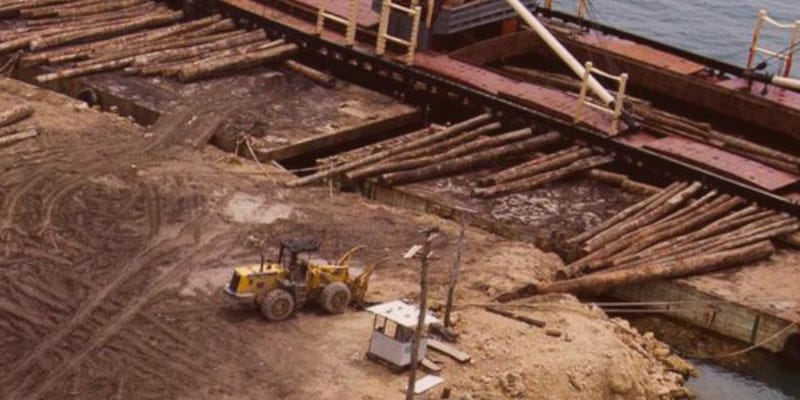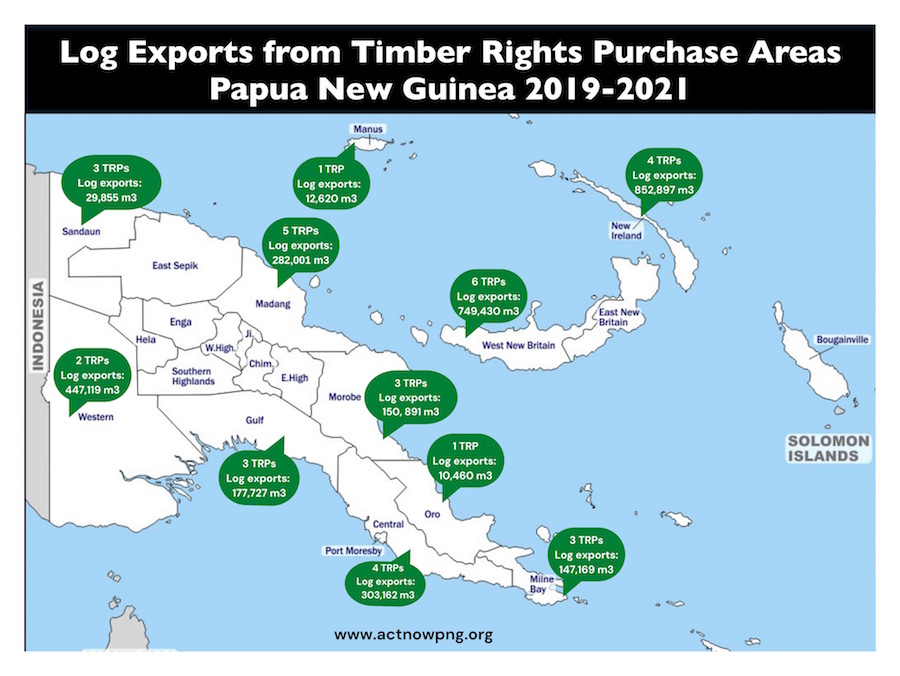Logging companies in Papua New Guinea in breach of Court Order banning logging
Meanwhile James Marape, PNG's prime minister, threatens to lift proposed 2025 ban on round log exports
In June 2021, Papua New Guinea’s Deputy Chief Justice issued a Court Order calling for an “immediate ban” on any logging in Timber Rights Purchase concessions. The ban remains in place until the Forest Authority and other government agencies provide the Court with a series of detailed reports on all logging operations in the country.
Act Now! reports that 31 large-scale logging operations “appear to be operating in defiance” of the Court Order in 29 Timber Rights Purchase concessions.
PNG authorities to provide detailed reports
The Court Order requires the Forest Authority to provide a report on all logging permits or forest clearance operations. The report must document the total forest area logged, the number of trees cut down, the number of logs exported, the social and environmental impacts of the logging operations.
The report must also document any remedial actions taken to address the impacts of the logging, and the value of improvements delivered to the customary landowners in the logging areas.
The Court Order also requires that the Forest Authority reports on the total:
“number of alternative programs such as carbon trade, being developed and implemented that are environmentally friendly and allows for the customary landowners and the country to economically make use of their limited forest reserves without destroying it and affecting the biodiversity within the forests and the environment generally;”
and,
“gains in development and other economic benefits the customary landowners and the country stands to gain from continued logging and deforestation as opposed to developing alternative sustainable and environmentally friendly economic programs such as corban [sic] trade that could be developed and pursued and thereby meaningfully contribute to domestic and global efforts toward mitigating climate change related risks.”
The Court Order requires that the Conservation and Environment Protection Authority (CEPA) provide a report on all Environmental Permits issued for all logging operations in the country.
The Climate Change Development Authority (CCDA) must provide a detailed report on the climate change impacts of logging and other deforestation activities, including mining.
CEPA and CCDA’s reports must also include the conditions, the monitoring evaluations, and compliance reviews carried out, the steps taken to mitigate environmental impacts including impacts on communities, any breaches of the environmental permit and remedial steps taken, and any prosecutions brought against breaches of the environmental permit.
Act Now! writes that,
“More than twenty months later, according to sources in the National Court, the Forest Authority and other agencies have yet to produce their reports and therefore the ban on logging in TRP areas is still in effect.”
In the 12 months following the ban, Forest Authority records show that 1.18 million cubic metres of logs were exported from the Timber Rights Purchase concessions by 26 foreign-owned logging companies. The value of the timber amounts to US$120 million.
Carbon offsets for big polluters
This week, James Marape, PNG’s Prime Minister will be attending the One Forest Summit in Gabon. Before leaving PNG, Marape said,
“At the Summit, I will deliver a Country Statement and hold bilateral discussions with the Presidents of the Republics of Gabon and France and other leaders on how we can protect and preserve the rainforests of the world in a sustainable manner.”
Marape is keen to set up carbon trading deals at the Summit in Gabon. PNG Bulletin reports him as saying that,
“I will be discussing options to work around Article 6 to find solutions that are applicable, precise and simplified to ensure that when our government makes a decision to reduce forest destruction, that the revenue forgone is replaced immediately by countries or large corporations so that we can continue to support our annual national budgets.”
Marape has no qualms about selling offsets to Big Polluters. “Domestically, we will also work with TotalEnergies, ExxonMobil and Santos to ensure their carbon footprint effectively delivers on preserving our forests,” he said.
In November 2021, at COP26 in Glasgow, Marape announced that,
“In forestry, we have ceased issuance of new timber permits and will ban export of round logs by 2025.”
As Colin Filer, honorary professor at the Australian National University, points out this proposed export ban is “not exactly a new promise”. In 1990, then-Forests Minister Karl Stack promised to impose a moratorium on round log exports. That was the first of a long series of promises from PNG politicians that were not met.
Filer predicts that the most likely outcome, based on his analysis and the history of the forestry sector in PNG, is that “business will simply carry on as usual”.
Somewhat perversely though, the threat of a ban on exports of round logs in 2025 puts logging companies “under pressure to extract as many bloody logs as they can over the next two or three years”, Filer recently told The Guardian.
Marape’s forest blackmail
Rather than upholding the existing Court Order that bans logging in Timber Rights Purchase concessions, Marape will use the One Forest Summit to threaten to lift the proposed 2025 ban on round log experts:
“I will issue an ultimatum to the Summit that I will uplift the proposed round log ban in PNG and proceed to harvest our timber resources because we need to be able to raise our own revenue through export taxes to support our socio-economic development aspirations.”
Marape argues that logging brings in US$300 million in export earnings annually. “If I impose a log ban the consequences will be detrimental to PNG’s revenue collection domestically,” Marape said.
This is a form of forest blackmail, long threatened by rainforest countries: Pay us, or the forests get the chop.






It's not quite similar to blackmail. "Developing" countries do indeed try to "develop," that is, step up to the "good life" enjoyed by the global North. To achieve that, they need money! Meanwhile they are crippled by international debt and lack the resources to implement any industrial-level energy sources based on non-fossil energy sources, facing a triple-whammy against any meaningful industrial production base. That is why I keep promoting "oxygen pricing" which would cause the rich nations to collect funds from people who "burn" oxygen to oxidize their fossil fuels, who are presently stealing that oxygen for free from the commons. Those funds would then transfer to countries with forests, in essence, paying them to produce oxygen. With carbon pricing (and their related offsets), you cannot balance that set of books, but with oxygen pricing, you can.